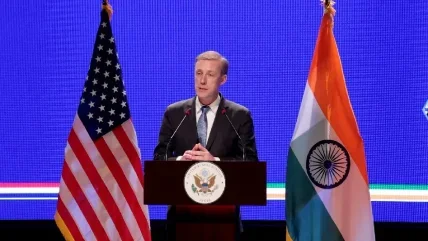
The US is set to revoke the long-standing regulations that have prevented civil nuclear cooperation between India’s major nuclear entities and US companies.
After India tested nuclear weapons in 1998, the US placed restrictions on more than 200 Indian nuclear entities, according to a Reuters report citing an anonymous Indian official.
However, several entities have been removed from the US Department of Commerce’s list over the years, owing to evolving bilateral ties between the two countries.
The list currently includes at least four entities of India’s Department of Atomic Energy, and some other nuclear reactors and power plants, said the report.
India and the US signed a civil nuclear cooperation agreement (123 agreement) in 2008 after India signed a safeguards agreement with the International Atomic Energy Agency.
The Nuclear Suppliers Group (NSG), a group of nuclear supplier countries, are signatories of the International Nuclear Non-proliferation Treaty (NPT).
NSG members ensure the non-proliferation of nuclear weapons by controlling the export of materials, equipment and technology that could potentially be used in their manufacture.
In May 2016, India applied to join the NSG, and the US is supporting its entry into the group.
The same year, Kovvada in Andhra Pradesh was selected for the construction of six AP1000 pressurised water reactors, but no contractual arrangements have been finalised.
The US National Security Advisor Jake Sullivan spoke at an event recently organised by the Indian Institute of Technology, in collaboration with the I-Hub Foundation for Cobotics (IHFC).
Sullivan said: “Although former President Bush and former Prime Minister Singh laid out a vision of civil nuclear cooperation 20 years ago, we have yet to fully realise it.
“This is a statement of confidence in the progress we have made – and will continue to make – as strategic partners, and as countries who share a commitment to peaceful nuclear cooperation.
“And it is the result of India’s open and transparent engagement with our Administration over the course of the past four years, which has enabled this new chapter to move forward.”
In a separate development, the US and the Republic of Korea (South Korea) have agreed on the principles concerning nuclear exports and cooperation.
The US Department of Energy (DOE) has signed a Memorandum of Understanding (MOU) with South Korea’s Ministry of Trade, Industry and Energy and the Ministry of Foreign Affairs.
The US and South Korea have been working on civil nuclear power for over 70 years.
The MoU represents the two countries’ dedication to maximising the peaceful uses of nuclear energy while ensuring nuclear safety, security, safeguards, and non-proliferation.
This MOU builds on the long-standing partnership between the two countries and provides a framework for cooperation in expanding civil nuclear power in third countries.
Also, the deal will strengthen the two countries with their administration of export controls on civil nuclear technology and promote new technologies.






